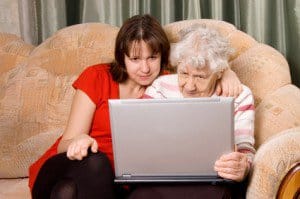Long distance caregiving of your elderly parents requires planning for a crisis. You can actually start that planning before your next visit by searching online for the many local resources that are available for your parent. Taking that list of resources with you during your next visit, you can add to the list by personally exploring additional resources and visiting with experts in geriatric care management.
Your first step is to identify community resources that are available in your parent’s community.
The first resource you want to consider is the local Area Agency on Aging closest to your parents. They maintain lists of private and public organizations that provide services to seniors. The simplest way to locate the one you’ll want is to do an online search for area agency on aging in the state where your parents live. That site will provide options to locate an office that is geographically close to your parents. You then can find their website and phone number and begin making connections.
Some of the services and resources the Area Agency on Aging provides may include:
Adult Day Services which provide activities and assistance for your parents with physical and/or mental impairments in a setting outside the home.
Care management which promotes programs that arrange for and monitor the use of community services to help your parents and people with disabilities avoid or delay institutional placement, while supporting independent living.
Chore Services established to restore or maintain a home including minor home repair, snow shoveling and cutting grass.
Congregate Meals for your parents which are served daily at community locations such as senior centers providing the participants with an opportunity to socialize with other older adults.
Counseling services to improve and resolve personal, social or emotional problems.
Environmental Modifications to prevent or minimize injuries in the home which may include installation or maintenance of various safety devices such as a medical alert system.
Hearing Impaired including adjusting lifestyle and living arrangements in response to hearing impairment and deafness.
Meals on Wheels which are balanced meals and those designed for special diets delivered to homebound and those physically or cognitively impaired older adults 60 years of age and older.
Homemaking services for your parents to help maintain a clean, safe and healthy home environment that may include housekeeping, light meal preparation, laundry and errand running.
Legal Services and representation by a lawyer, when required.
Medical Equipment accessibility such as devices, controls or appliances which enable your parents to increase their ability to perform activities of daily living.
Personal Care helps your parents with activities of daily living such as personal hygiene, grooming, bathing, dressing, meal preparation, homemaking and related services.
Personal Emergency Response or Medical Alert Devices that monitor you parent’s safety and provide access to emergency crisis intervention for medical and other emergencies.
Senior Centers identified that provide programs and activities for older adults.
Transportation options for your parents who are dependent upon the community where they live.
Vision Impaired Services for visually impaired or blind that include mobility training, rehabilitation for activities of daily living and optometry services to deal with vision loss.
Most communities also have volunteer services offered by senior centers, churches and synagogues. These may include meals-on-wheels, transportation, day care services, exercise programs, adult education programs such as learning to play bridge, as well as seminars covering a variety of topics led by local experts.
Contact the City Clerk in the municipality where your parents live and inquire about senior centers and senior recreational facilities. Ask for contact information including the website address and the phone number so that you can gather more information.
If your parents don’t already have one, you should consider contacting a medical alert company before your next visit. With proper timing, you should be able to arrange to have the system delivered by the time you arrive in order for you to assist with installation and initial testing of the unit. Wearing a medical alert pendant is an initial step that can minimize a crisis.



